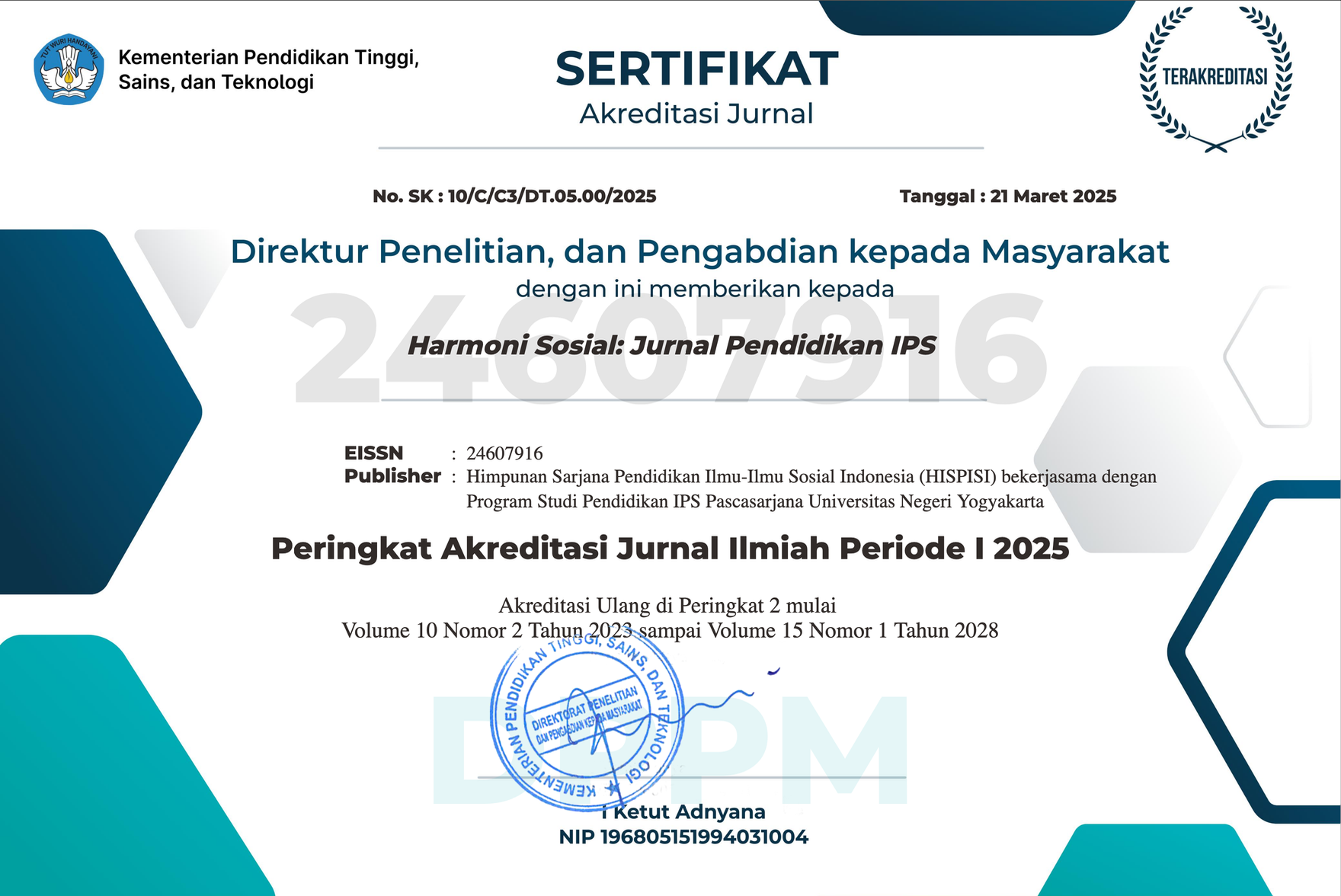Character analysis of the symbolic value of the Ngasa tradition
Downloads
Downloads
Alam, B. (2014). Globalisasi dan perubahan budaya: Perspektif teori kebudayaan. Antropologi Indonesia, 54, 1–11. https://doi.org/10.7454/ai.v0i54.3325
Asrawijaya, E. (2022). Harmonization between customs and Islam in the Jalawastu Community. JOURNAL OF INDONESIAN ISLAM, 16(2), 378–398. https://doi.org/10.15642/JIIS.2022.16.2.378-398
Budiarto, G. (2020). Dampak cultural invasion terhadap kebudayaan lokal: Studi kasus terhadap bahasa daerah. Pamator Journal, 13(2), 183–193. https://doi.org/10.21107/pamator.v13i2.8259
Darusman, Y. (2020). Local wisdom and environmental preservation (study on Sundanese indigenous people in East Priangan, West Java, Indonesia). PalArch's Journal of Archaeology of Egypt / Egyptology, 17(8), 453–469. https://archives.palarch.nl/index.php/jae/article/view/3438
Fadlillah, M. N., & Supriyanto, T. (2020). Upacara tradisi Ngasa di Dukuh Jalawastu Desa Ciseureuh Kabupaten Brebes. Sutasoma : Jurnal Sastra Jawa, 8(1), 16–25. https://doi.org/10.15294/sutasoma.v8i1.36691
Hanum, F., Rohman, A., & Rahmadonna, S. (2013). Pengembangan karakter anak melalui model Komunikasi Informasi Edukatif (KIE) pada masyarakat marginal di Kota Yogyakarta. https://eprints.uny.ac.id/23551/1/Laporan Tahun Ke 2 fix_opt.pdf
Humaeni, A. (2012). Makna kultural mitos dalam budaya masyarakat Banten. Antropologi Indonesia, 33(3), 159–179. http://journal.ui.ac.id/index.php/jai/article/download/2461/1890
Koentjaraningrat, K. (2002). Pengantar ilmu antropologi. Rineka Cipta.
Krippendorff, K. (2004). Content analysis: An introduction to its methodology. SAGE Publication.
Lickona, T. (1991). Educating for character: How our schools can teach respect and responsibility. "Ž Bantam.
Mardiatmadja, M. (1986). Hubungan nilai dengan kebaikan. Sinar Harapan.
Mubarok, M., Adnjani, M. D., & Iskandar, A. (2019). Makna simbol komunikasi dalam upacara adat Ngasa di Kampung Budaya Jalawastu, Desa Ciseureuh Kabupaten Brebes. Prosiding Konferensi Ilmiah Mahasiswa UNISSULA (KIMU) 2, 601–614. https://jurnal.unissula.ac.id/index.php/kimuhum/article/download/8180/3745
Mukhlis, J., & De Costa, S. L. E. (2021). Analysis of the Jalawastu area as a sustainable cultural tourism. Journal of Green Science and Technology, 5(1), 27–32. https://doi.org/10.33603/jgst.v5i1.4968
Permata, R. D., & Birsyada, M. I. (2022). Tradisi upacara adat Ngasa dalam konstruksi sosial masyarakat Dusun Jalawastu Ciseuruh. Gondang: Jurnal Seni Dan Budaya, 6(1), 12–22. https://doi.org/10.24114/gondang.v6i1.27199
Pratama, D. A. N. (2019). Tantangan karakter di era revolusi industri 4.0 dalam membentuk kepribadian muslim. AL-TANZIM : JURNAL MANAJEMEN PENDIDIKAN ISLAM, 3(1), 198–226. https://doi.org/10.33650/al-tanzim.v3i1.518
Rasyid, H. (2015). Nilai-nilai kearifan lokal dalam pengembangan pendidikan karakter di era global. EDUGAMA, 1(1), 1–31. https://www.academia.edu/download/83302247/42.pdf
Satianingsih, R., Budiyono, S. C., & Subandowo, M. (2020). Character education in multicultural society: Case in Indonesia. International Journal of Multicultural and Multireligious Understanding, 7(4), 337–344. https://ijmmu.com/index.php/ijmmu/article/view/1407
Sobur, A. (2004). Peran pers Islam dalam upaya mendorong proses demokratisasi di Indonesia. Mediator: Jurnal Komunikasi, 5(2), 243–264. https://scholar.archive.org/work/h3cvmtkharh7lgah4medf6c2de/access/wayback/https://ejournal.unisba.ac.id/index.php/mediator/article/download/1160/pdf
Suhartini, S., Sekarningrum, B., Sulaeman, M., & Gunawan, W. (2019). Social construction of student behavior through character education based on local wisdom. Journal of Social Studies Education Research, 10(3), 276–291. https://www.learntechlib.org/p/216467/
Sukmayadi, T. (2016). Kajian tentang karakter berbasis nilai-nilai kearifan lokal pada masyarakat adat Kampung Kuta Kecamatan Tambaksari Kabupaten Ciamis. Jurnal Civics: Media Kajian Kewarganegaraan, 13(1), 96–112. https://doi.org/10.21831/civics.v13i1.11079
Sulaiman, S. (1992). Strukur sosial dan nilai budaya masyarakat pedesaan. APD.
Thoma, S., & Walker, D. I. (2017). Moral and character education. In Oxford Research Encyclopedia of Education. Oxford University Press. https://doi.org/10.1093/acrefore/9780190264093.013.119
Turner, V., Abrahams, R., & Harris, A. (1969). The ritual process: Structure and anti-structure. Routledge.
The Authors submitting a manuscript do so on the understanding that if accepted for publication, copyright publishing of the article shall be assigned to Harmoni Sosial: Jurnal Pendidikan IPS
 | Harmoni Sosial: Jurnal Pendidikan IPS by http://journal.uny.ac.id/index.php/hsjpi is licensed under a Creative Commons Attribution-ShareAlike 4.0 International License. |









 ISSN Print
ISSN Print









